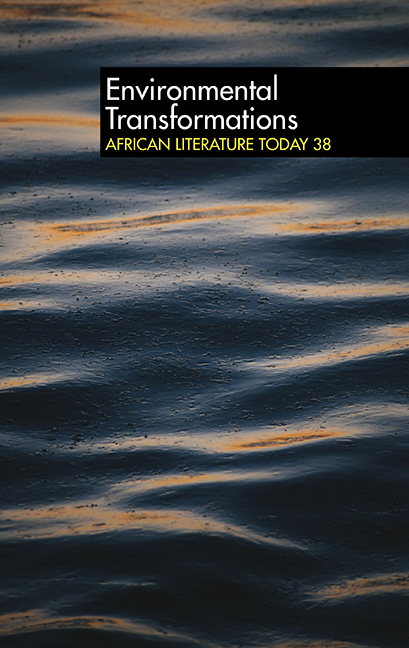Book contents
- Frontmatter
- Contents
- Notes on Contributors
- Introduction: Itinerariesof African Ecocriticism and Environmental Transformations in African Literature
- Literary Totemism and its Relevance for Animal Advocacy: A Zoocritical Engagement with Kofi Anyidoho’s Literary Bees
- Reading for Background: Suyi Davies Okungbowa’s David Mogo, Godhunter and ‘the end of the world as we know it’
- Poetics of Landscape: Representation of Lagos as a ‘Modernizing’ City in Nigerian Poetry
- Poetic Style and Anthropogenic Ecological Adversity in Steve Chimombo’s Poems
- Female Autonomy in Kaine Agary’s Yellow-Yellow
- Local Collisions: Oil on Water, Postcolonial Ecocriticism, and the Politics of Form
- ‘It is the Writer’s Place to Stand with the Oppressed’: Anthropocene Discourses in John Ngong Kum Ngong’s Blot on the Landscape and The Tears of the Earth
- Black Atlantic Futurism, Toxic Discourses and Decolonizing the Anthropocene in Nnedi Okorafor’s The Book of Phoenix
- Readings into the Plantationocene: From the Slave Narrative of Charles Ball to the Speculative Histories of Octavia Butler and Nnedi Okorafor
- INTERVIEW
- LITERARY SUPPLEMENT
- TRIBUTE
- REVIEWS
Poetic Style and Anthropogenic Ecological Adversity in Steve Chimombo’s Poems
Published online by Cambridge University Press: 07 November 2020
- Frontmatter
- Contents
- Notes on Contributors
- Introduction: Itinerariesof African Ecocriticism and Environmental Transformations in African Literature
- Literary Totemism and its Relevance for Animal Advocacy: A Zoocritical Engagement with Kofi Anyidoho’s Literary Bees
- Reading for Background: Suyi Davies Okungbowa’s David Mogo, Godhunter and ‘the end of the world as we know it’
- Poetics of Landscape: Representation of Lagos as a ‘Modernizing’ City in Nigerian Poetry
- Poetic Style and Anthropogenic Ecological Adversity in Steve Chimombo’s Poems
- Female Autonomy in Kaine Agary’s Yellow-Yellow
- Local Collisions: Oil on Water, Postcolonial Ecocriticism, and the Politics of Form
- ‘It is the Writer’s Place to Stand with the Oppressed’: Anthropocene Discourses in John Ngong Kum Ngong’s Blot on the Landscape and The Tears of the Earth
- Black Atlantic Futurism, Toxic Discourses and Decolonizing the Anthropocene in Nnedi Okorafor’s The Book of Phoenix
- Readings into the Plantationocene: From the Slave Narrative of Charles Ball to the Speculative Histories of Octavia Butler and Nnedi Okorafor
- INTERVIEW
- LITERARY SUPPLEMENT
- TRIBUTE
- REVIEWS
Summary
Steve Chimombo (1945–2015) is regarded as Malawi's most versatile and prolific writer. As a novelist, short-story writer, poet, playwright, and academic, he published a number of works in his lifetime. In his writings he tackles a range of social, economic, political, cultural and environmental issues in his country and beyond. Bright Molande (2011) characterizes him as a writer with a tragic vision as in his works he mostly depicts the tragedies of colonialism, postcolonialism, neocolonialism and post-independence in Africa. Chimombo fits Nggū's description of a writer as someone who ‘responds, with his total personality, to a social environment which changes all the time’, one who acting like ‘a kind of sensitive needle, […] registers, with varying degrees of accuracy and success, the conflicts and tensions in his changing society’ (Ngīgū1972, 47). One of the changes that Chimombo registers concerns the environment, the focus of this article. In focusing on the environmental issues in Chimombo's poetry this article departs from the popular approach to his poetry by critics, who have mostly read Chimombo's poetry from social, cultural and political perspectives (see Nazombe 1983; Roscoe and Msiska 1992; Msiska 1995; and Molande).
Chimombo's interest in environmental issues and landscapes is evident in his earliest published poetry, which exploited the mythical phenomenon of Napolo as an aesthetic and mythological framework to explain various tragic and cataclysmic events in the world of politics and nature; in the case of the latter those associated with water and wind (Molande 32–3). In Malawian myth and cosmology Napolo is believed to be a giant subterranean serpent spirit that causes ‘heavy rains, landslides, hurricanes, earthquakes and floods every time it erupts from its subterranean lair’ (Molande 32) to embark on a river or air voyage to the lake or sea. In most cases the invocation of the mythic Napolo in Malawi follows disastrous events of huge ī proportions that become incomprehensible to the human psyche. In Chimombo's poetry Napolo assumes many guises and these include functioning as a metaphor for Malawi's first president – Dr Hastings Kamuzu Banda – and his oppressive regime (Msiska 74), an oracular voice and godhead, beside the literal representation as a mythic subterranean serpent spirit.
- Type
- Chapter
- Information
- ALT 38 Environmental TransformationsAfrican Literature Today, pp. 50 - 64Publisher: Boydell & BrewerPrint publication year: 2020

